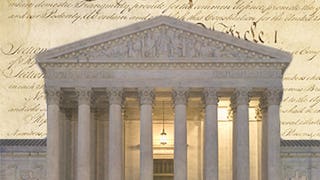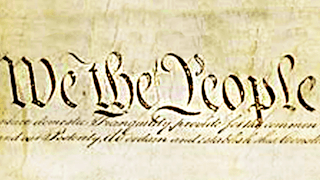Chemerinsky on Constitutional Law: Individual Rights and Liberties will highlight the construction and interpretation of the U.S. Constitution through the centuries with an emphasis on protections of individual liberties and the evolution of equal protection. You'll learn the history behind the Constitution, cases that formed important precedent, and how changes in interpretation have been dependent on shifts in cultural and political climate as well as the composition of the Supreme Court.

Genießen Sie unbegrenztes Wachstum mit einem Jahr Coursera Plus für 199 $ (regulär 399 $). Jetzt sparen.

Chemerinsky on Constitutional Law – Individual Rights and Liberties

Dozent: Erwin Chemerinsky
13.094 bereits angemeldet
Bei enthalten
(84 Bewertungen)
Kompetenzen, die Sie erwerben
- Kategorie: Social Studies
- Kategorie: Policy Analysis
- Kategorie: Court Systems
- Kategorie: Legal Research
- Kategorie: Civil Law
- Kategorie: Law, Regulation, and Compliance
- Kategorie: Case Studies
- Kategorie: Case Law
- Kategorie: Social Justice
Wichtige Details

Zu Ihrem LinkedIn-Profil hinzufügen
Erfahren Sie, wie Mitarbeiter führender Unternehmen gefragte Kompetenzen erwerben.

In diesem Kurs gibt es 7 Module
Das ist alles enthalten
1 Video3 Lektüren
How are individual rights protected? In this module we’ll take a look at three of the structures that protect our individual liberties: the state action doctrine, the application of the bill of rights to the states, and the levels of scrutiny principle.
Das ist alles enthalten
3 Videos1 Lektüre1 Aufgabe
What rights are enumerated in the Constitution? How has the court's understanding and protection of these rights evolved? In this lecture we'll become familiar with the rights that are both specifically enumerated and implied by the text of the Constitution.
Das ist alles enthalten
8 Videos1 Lektüre1 Aufgabe1 peer review
In this module we’ll examine how equal protection has been applied to different suspect classifications such as race, gender, citizenship, and more. In addition, we will consider how the court has used levels of scrutiny in order to determine when the government can permissibly discriminate based upon suspect classifications.
Das ist alles enthalten
7 Videos1 Lektüre1 Aufgabe1 peer review
Why is freedom of speech protected as a fundamental right? What is its importance? In this module we’ll review four possible answers to this question. We’ll also examine the basic principles that guide the Supreme Court’s methodology when examining questions of free speech. Finally, we’ll take a look at the types of speech that have not been traditionally protected and the limitations that can be imposed on where protected forms of speech can be exercised.
Das ist alles enthalten
4 Videos1 Lektüre1 Aufgabe1 peer review
In our final lecture module, we’ll briefly examine the Lemon Test, named after the Lemon v. Kurtzman case in which it was first articulated, to see how the court has evaluated cases regarding the Establishment Clause. We’ll also take a look at how the court decides questions regarding the Free Exercise Clause.
Das ist alles enthalten
1 Video1 Lektüre1 Aufgabe1 peer review
As the course draws to a final close, we would like to thank you for your participation.
Das ist alles enthalten
2 Lektüren
Dozent

Mehr von Law entdecken
 Status: Vorschau
Status: VorschauUniversity of California, Irvine
 Status: Vorschau
Status: VorschauUniversity of Pennsylvania
 Status: Vorschau
Status: VorschauYale University
 Status: Vorschau
Status: VorschauYale University
Warum entscheiden sich Menschen für Coursera für ihre Karriere?




Bewertungen von Lernenden
84 Bewertungen
- 5 stars
91,66 %
- 4 stars
5,95 %
- 3 stars
1,19 %
- 2 stars
0 %
- 1 star
1,19 %
Zeigt 3 von 84 an
Geprüft am 1. Dez. 2020
Erwin is an experienced professor who has a way with the law. He explains in a way that would be easy for a lay person to understand. I hope to learn with him again in the future.
Geprüft am 14. Juli 2017
Fantastic course. Interesting subject and great lecturer. I learned a lot and would take any course from Dr. Chemerinsky.
Geprüft am 9. Apr. 2020
Chermerinsky's classes were the best that I have taken. Very interactive and the fellow students really participated which made the class worth attending.
Häufig gestellte Fragen
To access the course materials, assignments and to earn a Certificate, you will need to purchase the Certificate experience when you enroll in a course. You can try a Free Trial instead, or apply for Financial Aid. The course may offer 'Full Course, No Certificate' instead. This option lets you see all course materials, submit required assessments, and get a final grade. This also means that you will not be able to purchase a Certificate experience.
When you purchase a Certificate you get access to all course materials, including graded assignments. Upon completing the course, your electronic Certificate will be added to your Accomplishments page - from there, you can print your Certificate or add it to your LinkedIn profile.
Yes. In select learning programs, you can apply for financial aid or a scholarship if you can’t afford the enrollment fee. If fin aid or scholarship is available for your learning program selection, you’ll find a link to apply on the description page.
Weitere Fragen
Finanzielle Unterstützung verfügbar,
¹ Einige Aufgaben in diesem Kurs werden mit AI bewertet. Für diese Aufgaben werden Ihre Daten in Übereinstimmung mit Datenschutzhinweis von Courseraverwendet.





